Peter MALONE
Saturday, 18 September 2021 19:33
Murder at 75 Birch
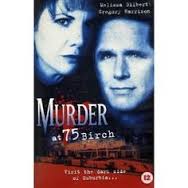
MURDER AT 75 BIRCH
US, 1996, 95 minutes, Colour.
Melissa Gilbert, Gregory Harrison.
Directed by Michael Scott.
Murder at 75 Birch is based on a true story. The focus is on two close-knit families, two brothers. When the wife of one of them is murdered, suspicion falls on the husband. However, he has covered his tracks well and made demands on his brother - who then is killed. The focus of the investigation then is on the sister-in-law who, herself, starts investigating and finds evidence of the truth.
The film is conventional material, but quite well done, good writing and performances by Melissa Gilbert and Gregory Harrison, both of whom have made their careers in television and telemovies.
1. Entertaining telemovie? For the wide home audience? Psychological thriller? Murder mystery?
2. The settings: the suburbs, homes, streets, the police precinct, the dentist's office? Musical score?
3. The title and its focus? Direct?
4. The structure of the film: Gwen and her going to the police, the flashbacks, the gradual build-up of her story, her changing attitudes, allegiances, the death of her husband, the impact of Rick and his attentions, his behaviour and affairs, discovery of the truth, confrontation? The effectiveness of the flashbacks and the gradual revelation of the truth?
5. The two families and their closeness, the rivalry between the brothers (at baseball etc.)? The friendship of the two wives? The children? The impact of the death of Pat? The repercussions for all of them?
6. Gwen, her character, love for her husband, child? Friendship with Pat? Relationship with Rick? Looking after their child? The picnics, baseball games, visits and meals? The bonds between them? The impact of Pat's death on Gwen? Shock, looking after their daughter? Discussions with her husband, his death? Her grief? Rick and his attentions, their going out together? People's suspicions? The receptionist and her relationship with Rick? Maggie and her relationship? Gwen and the build-up of the truth? Her going to the police, antagonism towards the interrogator? Her gradually revealing the truth? Getting evidence - and the necklace? The final confrontation with Rick?
7. Rick, smooth, rivalry with his brother? Family? The dentist, the aerobics, the man-about-town? The affair with the receptionist, with Gwen's friend? The assault, the police evidence, suspicions? His behaviour after his wife's death, his affairs, his attraction towards Gwen? Covering his tracks? The flashback to the murder, the necklace?
8. Pat, the good woman, forgiving her husband? The challenge and her death? Dave and his friendship with his brother, driving and his death?
9. The women in the town, the aerobics classes, the school? Maggie and her reaction to Gwen? The receptionist - and her telling the truth?
10. The authentic background of the investigation, ordinary life in the town, school, dentist, police precincts? An effective case study?
Published in Movie Reviews
Published in
Movie Reviews
Tagged under
Saturday, 18 September 2021 19:33
Murder By the Book
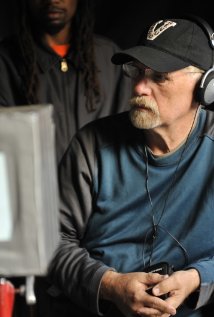
MURDER BY THE BOOK
US, 1987, 100 minutes, Colour.
Robert Hays, Catherine Mary Stewart, Fred Gwynne, Celeste Holm.
Directed by Mel Damski.
Murder By The Book is an enjoyable caper murder mystery. It has echoes of the Romancing the Stone genre. It could also be compared, in its light way, with Larry Gelbart's and Cy Coleman's musical, City of Angels, where a detective and his alter ego character dialogue.
Robert Hayes enjoys himself as the rather serious writer of murder mystery paperbacks who wants to write something better. He enjoys himself even more as Biff Degan, the tough private eye who comes to life and dialogues with him. Katherine Mary Stuart is the heroine. Fred Gwynne enjoys himself as a greedy and sinister art dealer. Celeste Holm makes a cameo appearance as the dominating mother.
Nothing special, but nicely and lightly entertaining.
1.Entertaining telemovie? Murder mystery? Thriller writer? Private eye?
2.New York settings, the world of the novelist, the city itself, the art world? Musical score?
3.The title, the reference to the writer, his ideas in creating a character, his subconscious, popular writing and the wide audience, the character coming to life and advising the writer how to solve the case?
4.Hank, his success, his nightmares and fighting with Biff? His wanting to change his style? The domination of his mother and her literary circle? Her taunting him? His agent and the bet? The meal, attracted to Marisa, seeing her kidnapped? The matchbox? Following the clues, the hotel, the clerk and his responding to Hank's reputation? The disordered room? The link with Victor, pretending to research the book? His being followed, Biff's appearances, wisecracks, language style (and Hank changing his vocabulary)? (The humour of the Invisible Man style of comedy with Biff talking to the air and people watching?) The murder from his apartment, the police inspector and his interrogations, the police and the arrest, being charged with murder? With Marisa, the phone call, discussions, trying to retrieve the photos, the death of the private eye? The woman and her shooting? The death of the clerk? Being out on bail, interviews? Victor and the drug interrogation of Marisa and of Hank? Biff getting him out? The rescue of Marisa? The showdown, the visit to the gallery, his bluffing, the fight, the shootout - and Peter's arrival? The solution of the case? His mother's disapproval of Marisa? The farewell, his growing a beard and writing the serious book, the failure, Marisa's phone call, falling in love, a new Biff Degan book?
5.Biff Degan and his appearance, moustache, clothes and hat? Language? The figment of Hank's imagination? The dialogue with his subconscious? Helping him out in tight spots, Biff getting offended, the returns and the rescues?
6.Marisa, her wealth, the art background, her brother and his skills, mounting the exhibition, taken by Victor, the interrogations, the photos, using Hank? The showdown? The success of the show - and her return?
7.Victor, sinister, his henchmen, the murder of the man following him, the murder of the clerk, the private eye? The convolutions of the plot? Timothy and his drug interrogations? Victor and the suave manner, the director of the museum being in on the plan? Peter's not being dead, disguised as a woman, the confrontation, the blackmail intentions? the shootout - Hank thinking he had shot Victor, but Marisa shooting?
8.The supporting cast - from private eye thrillers: the admiring English clerk, his breaking the rules, his death? The small private eye pretending to be a policeman?
9.Hank's mother, her dominance, literary circles?
10.Popular ingredients for a murder mystery, a caper in New York, odd characters - and fond memories of private eye thrillers?
Published in Movie Reviews
Published in
Movie Reviews
Tagged under
Saturday, 18 September 2021 19:33
Mr Destiny
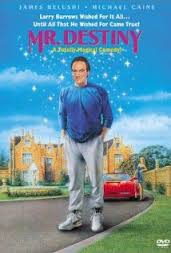
MR DESTINY
US, 1990, 105 minutes, Colour.
Michael Caine, James Belushi, Linda Hamilton, Jon Lovitz, Hart Bochner, Rene Russo.
Directed by James Orr.
Mr Destiny is an easygoing and pleasant fable about the meaning of life and one's choices. It is a variation on the
It's a Wonderful Life theme, using Mr Destiny (Michael Caine) instead of an angel but having the hero, Larry Burrows, played by James Belushi, going into a world which is the consequence of an alternate choice. Needless to say, he discovers the truth about himself and returns happily to his own life.
James Belushi is pleasant and easygoing in the central role, toning down a lot of the manic behaviour he exhibited in earlier films like The Man With The One Red Shoe and About Last Night. With such films as Curly Sue and Only the Lonely, he entered more of mainstream Hollywood romantic dramas. Michael Caine is, as always, genial as Mr Destiny. There is a good supporting cast including Jon Lovitz as his best friend, Hart Bochner as the smooth and manipulative executive, Linda Hamilton (Beauty and the Beast, the Terminator films) as his wife and Renee Russo (One Good Cop, Lethal Weapon 3) as the daughter of the boss.
There is nothing particularly new about the film or its treatment - however, it is the easygoing fable that audiences can sit back and enjoy - and get the point about the consequence of choices and being satisfied with the world that they find themselves in and the choices that they have made.
1.The blend of realism and fantasy? A fantasy about the American way of life? For non-American audiences?
2.The American city, 1970 and the baseball setting, 1990, ordinary homes and suburbs, the workplace, the wealthy homes? Musical score, theme song at the end?
3.The title, the focus on life, the meaning of life, choices?
4.An effective moral fable about life, choices and consequences, imagining another life - and being satisfied with what one takes responsibility for?
5.Larry and James Belushi's presence and style, the introduction with the breaking down of the car, going back to 1970, the build-up to the pitched ball, the split-second, hitting into the gloved hands, everybody silent, the condemnation, Ellen coming to the dressing room and consoling him, his best friend cheering him up with tricks? His marrying Ellen, their love, the house together, trying to get the builder to fix the path and the garden, the cheque, taking it out on Ellen? Going to work, nobody remembering his birthday, his best friend giving him the vomit gift? The executives and their plans for the Japanese? The boss and his being shunted off to play golf? The boss's daughter and her husband and his attraction? Jokes with his best friend and his playing pranks? Ellen and the work for the unions, the lunch? His taking inventory of the stock, meeting Jewel, his father and his roving eye? The birthday and everything going wrong?
6.Waiting for the tow truck, the bar and the lights coming on, meeting Mike, Mike and his conversation, listening, offering him the drink, allowing him the consequences of his choice of succeeding at baseball in 1970?
7.The alternate world and Mike's explanations of the different events and their consequences? Going back home, the path fixed, the policeman not letting him in? Mike's reappearances as taxi driver, at the social, in the mirror and helping him through? Finding his home, Cindy and the kids, the formality of their styles, terror at the meal table? His having to cope with this new way of life - even to the butler's name, his drinks, where the toilets were? His wealth? The cars in the garage? The executives and their kowtowing to the boss, their plans? His father-in-law and his fear of him? The clash with Jewel and her being his mistress? His curiosity about Ellen, finding her? His best friend in terror of him? Home, the birthday party, the speeches, the gift of cheese? The sexual encounter with Cindy? His father and the divorce and his being with the young girl? His trying to change things, saving Cliff from throwing himself from the top of the building, offering him the vice-presidency? The board meeting, the conditions and the concessions to the union, having dinner with Ellen, the French meal, the pizza? His telling her all the stories about her past? Her reconciling with her husband? His spending the night up the tree, afraid of the dog? His decision about the firm, wanting to oust the executives?
8.His waking up, finding Mike again, the real world? The tow truck man, hurrying to the meeting and exposing the executives? Going home, the birthday surprise, Ellen and her love, his best friend, Cindy and her husband turning up, offering him a job for the future?
9.The film ending with the return to 1970, Mike in the stands watching Larry, talking about his choices in the future - and Larry's reaction?
10.A satisfying and enjoyable fable?
Published in Movie Reviews
Published in
Movie Reviews
Tagged under
Saturday, 18 September 2021 19:33
Moving Target
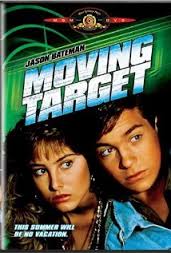
MOVING TARGET
US, 1988, 89 minutes, Colour.
Jason Bateman, Tom Skerritt, Jack Wagner, John Glover, Chyna Phillips, Richard Dysart, Robert Downey Sr.
Directed by Chris Thomson.
Moving Target is an interesting if average thriller. It focuses on a young man, strained relationships with his family, his going to a music camp, returning home to find the family completely vanished and a killer pursuing him.
Jason Bateman is the young man, Tom Skerritt his father, John Glover (usually a sinister villain) is a genuine agent. Richard Dysart is the tycoon villain.
The film focuses on financial companies, the laundering of money for the Mafia, witness protection programs.
1.Entertaining thriller? Human drama?
2.Thriller designed for the wide television audience? The young audience with the hero? The American settings, the special effects and stunt work? The action sequences? The musical score?
3.The title, the focus on Toby and the pursuit?
4.The Kellogg family, the father and his work, relationship with Arthur Cambridge? The tension at home? The children, Toby and his band, alienation from the parents? His going to the music camp? The phone calls? The success of the band - and his return home to find the house empty?
5.Joe Kellogg, the dinner, the agents, his being taken away in the car? Audience suspicions? Cambridge's presence in the restaurant? His information, testimony for the court, the laundering of money? The witness protection program, change of name, identity, home?
6.Toby, his friends, Geoff, Megan and the band? At the camp? His return home, friendship with Geoff? The empty house, the puzzle, the phone calls, the police? His running away? Going to the party, moody with Geoff, the change of coat - and Geoff's death? Megan and her help? Talking things over with the police? Going to Boston, the murder of the agent in the airport? Phone calls to Megan, the information, commandeering the car? The confrontation with the killer - and the stunt with the fire brigade? Reunited with his parents? The new name and identity and reunited with Megan?
7.Geoff, the band, friendship, the fight, the change of coat, driving in the car, his disbelief and his death?
8.Megan, in the band, friendship with Toby, help, information? The dog tags and using her ingenuity?
9.The police agents, the testimony against Cambridge? The killer and the murders? The hired killer, the Mob, the mistake, killing Geoff, pursuing Toby, the murder of the agent, the threat to the family?
10.The credibility of this kind of story, American finance, the Mafia, justice and the courts, witness protection programs?
Published in Movie Reviews
Published in
Movie Reviews
Tagged under
Saturday, 18 September 2021 19:33
Moving
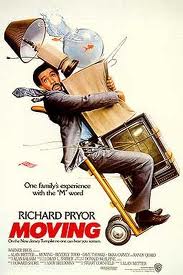
MOVING
US, 1988, 89 minutes, Colour.
Richard Pryor, Beverly Todd, Dana Carvey, Randy Quaid.
Directed by Alan Metter.
Moving is a mid-'80s Richard Pryor comedy. It is more restrained than many of his previous comedies and his concerts. It shows a more genial, sentimental side.
The film is about everybody's nightmare, loss of job, the need to move interstate, all the hazards and hassles of the moving process. In this way, the film is something of a suburban nightmare (and might be compared with Tom Hanks and Bruce Dern in The Burbs). While the material is predictable enough, it is done with a strange blend of genial tone touched with edginess which highlights the nightmare of moving.
Richard Pryor is good in the central role, supported by Beverley Todd and by Randy Quaid as ex-marine fanatic and eccentric neighbours (twins). Direction is by Allan Metter (Back to School) and photography is by Australian Donald Mc Alpine.
1.American comedy: careers, changes, family?
2.Moving as a symbol: reality, comic, nightmare?
3.The contrasts between suburban life in New Jersey and life in Idaho?
4.The New Jersey style: waking up in the morning, Arlo's dream about fighting Frank, Frank and his huge machine for cutting the lawn, Frank and his terrorising the neighbours, Arlo washing the car with the controlled helicopter hovering? The sequences with the buyers of the house? The contrast with buying the house in Idaho and the west? The buyers and sellers?
5.Arlo's job, losing his job, despair, the suddenness of the new offer, having to make a decision, the reaction of Casey and her not wanting to go, the boys, Monica? His reaction at the table? Casey's stunts to put off the buyers, especially hanging in the cellar? The irony of Frank welcoming the visitors and bringing the cake? Selling the house?
6.The moves for moving: the calendar and the family meeting, the week for selling the house, the quotations and the types why came for packing and moving? The very old man doing the packing and his being paid by the hour? The movers and their appearance, creating a mess? The irony of their being pals of Frank? The driver of the car - and the discovery that he had eight personalities? Casey's decision to marry and wanting to stay? The happy resolution with the neighbours taking her in? The driver's going to New Orleans? Arriving in Idaho and not only the house being empty but the kitchen, pool and staircase and doors being taken away? The welcoming committee?
7.Frank, the background in the Marines, mowing the lawn, the helicopter, the cake, taking all the mustard at the garage sale, refusing to give back Arlo's goods? His pals? The irony of Cornell living next door, mowing the lawn, dominating? Intimidated by the dog?
8.The driver with his multiple personalities: the clean-cut young man, the woman passing them on the road, the punk, the driver at the end?
9.Desperation in Idaho, the boys and their tricks at school exploiting the fact that they were twins? No furniture? Arlo going to work, everybody nice, the company suddenly collapsing, the television interviews? His drinking, seeing the woman interviewed on television advocating change as good? His reactions and determination to do something?
10.The finale: `people to kill', the movers and his attack on them, the smashing of the limousine, the businessman and his decisions to take Arlo back, Cornell and the dog?
11.The nightmare of moving, audiences identifying with it? The lyrical and sweet happy ending - waking up to reality? Or not?
Published in Movie Reviews
Published in
Movie Reviews
Tagged under
Saturday, 18 September 2021 19:33
Mother's Boys

MOTHER'S BOYS
US, 1994, 95 minutes, Colour.
Jamie Lee Curtis, Peter Gallagher, Joanna Whaley- Kilmer, Vanessa Redgrave, Joss Ackland.
Directed by Yves Simoneau.
Mother's Boys is a menace thriller - with the ingredients probably better than the finished product. The film looks stylish and was directed by Yves Simoneau. The cast is particularly strong, with Jamie Lee Curtis enjoying herself as a rich psychotic mother who abandons her children, is jealous of her ex-husband, comes back to destroy them all. The husband is played by Peter Gallagher, his girlfriend, a deputy principal at the school, is Joanna Whaley- Kilmer. The children's performances are also particularly good. There are some guest stars in support, especially Vanessa Redgrave as the grandmother and Joss Ackland, momentarily seen as a lawyer.
The film capitalises on Jamie Lee Curtis's presence, her sinister behaviour, her relationship with her mother and her dead father. However, it is highly melodramatic, especially the literal cliff-hanging finale.
1.Menace thriller, family thriller, the popularity of the genre?
2.The title and its ironies of love and hate?
3.The affluent background, the house, town, school, hotels? The musical score?
4.The strength of the cast?
5.The boys: Kes and his rage, Michael and his reactions, Ben as young and easily influenced? At school, Kes and the dissection of the frog, the class, his anger, the interview with the vice-principal? The boys and their relationship amongst themselves? The hesitant attitudes towards Callie? The relationship with their father? Love for their grandmother? The outbursts, their absent mother, her coming back, the gifts, the visit to the Planetarium? Their being seduced by their mother, especially Kes?
6.Robert as genial? His work, love for the boys, the experience with Jude? Love for Callie, hope for the future?
7.Callie, good woman, her work at the school, discreet with the children, supported by Lydia? The clashes with Jude, the interview at the school, her violence? Her becoming the victim of Jude's manipulation, turning the children against her? Jude attempting to smother her?
8.Lydia and the memories of her marriage, her husband, the incestuous relationship with the daughter? The sadness of her memories? Love for her daughter, but unable to relate to her? Fearing her reactions? Her severity with Jude? Love for her grandchildren? Listening to the boys, knowing what they were planning, the accident and her falling down the stairs? Hospital, Jude's visit, Jude's murderous intent towards her mother?
9.Jude, wealth, menacing her children, spoilt, the marriage, the divorce, her travel, return, the visits? Her relationship with Robert and attempt to seduce him? With her mother? The boys, her dislike of Callie, the impersonation at the school, the confrontation? The Planetarium? Discussing the games with the boys, the courts, the justice and the sentence? The practical joke against Callie, the violence, the car without brakes? Her going to see her lawyer?
10.The plan, Callie and her being imprisoned, the game and the trial, the handcuffs? Ben, the accident, the blood?
11.Callie and Ben, running, the dog, the car, the crash? The car on the cliffs, the danger for the boys, Kes and his change of heart, Callie and the rescue? Jude's death?
12.Melodramatic ingredient, stylishly done? How enjoyable is this kind of family nightmare?
Published in Movie Reviews
Published in
Movie Reviews
Tagged under
Saturday, 18 September 2021 19:33
Mortal Fear
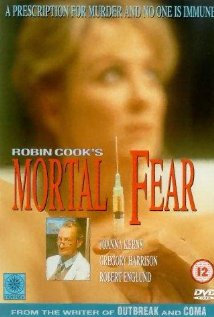
MORTAL FEAR
US, 1994, 86 minutes, Colour.
Joanna Kerns, Gregory Harrison, Robert Englund.
Directed by Ralph Wanamaker.
Robin Cook's Mortal Fear is a brief telemovie, adapting a story by the celebrated novelist, whose focus is on murder mysteries in a medical context - Coma is his best-known film adaptation.
The setting is a hospital where people are unexpectedly dying. Audiences will not be surprised at who the villain is - despite the guest appearance of Robert Englund (the screen's Freddie Kruger) as a seemingly sinister doctor. The focus is on Joanna Kerns, best known for appearances in telemovies, as a doctor baffled by the mysterious deaths. Gregory Harrison portrays the chief executive officer of the hospital, Max Gail is the detective.
The material is fairly predictable - probably the main plot outline of Robin Cook's original story. However, Joanna Kerns plays it very seriously, Gregory Harrison is very earnest. It is an enjoyable pastime telemovie.
1.Robin Cook and his novels? His medical background? The murder mysteries? The adaptation of a story to the screen? The basic elements and basic themes?
2.The city setting, the hospital, apartments, the nightclub? Musical score?
3.The title and its focus on the illness, the researcher, fear and death? Mortal fear for Jennifer?
4.The focus on Jennifer, her work at the hospital? The opening and her memories of her dead husband? The mysterious death and the reaction of the widow? Her violence? Her own diagnosis and death? The meetings, the social and her not wanting to dance? Philip's approach? Their watching Dr Hayes and his girlfriend and her performance? The relationship with Philip, her hesitations? The mystery of the deaths, her investigation? Dr Hayes and the dinner appointment and his death? Her going to his laboratory, his assistant and her hostility, telling the story? Ralph and his offhand remarks, his presence in the laboratory? Her suspicions? The encounters with the detective and the discussions? The x-rays, her going to find Carol, rescuing her from the pursuers? Her death? The meeting with Philip, his revelation of the truth, her horror, his being injected - and her going to be with him as he died? The resolution of the mystery?
5.Philip, the debonair chief executive officer? Flirting with Jennifer, the relationship? His attitude towards the hospital, administration and money? The mystery, dealings with the police? The revelation of the truth, his playing God, decisions about life and death and whose life was worthless? His pleading with Jennifer, his being injected?
6.The contrast with Ralph, his cynical presence, the operations, clashes with Jennifer, his being in the laboratory? The x-rays? The pursuit of Jennifer and Carol - and the revelation that he was investigating the mystery?
7.The detective, offhand manner, chatting with Jennifer, surveillance?
8.Dr Hayes, his research, Carol and the relationship? His assistant and her intense devotion - hostility towards Jennifer, her being killed? Hayes and the meeting with Jennifer, his death? The research, the genes? Playing with life and death, healing? His results being used by Philip?
9.The victims, the executive and his attack, his hostile wife, the interview with Jennifer, her death?
10.The popularity in the '90s of television soap operas set in hospitals? Murder mysteries set in hospitals?
Published in Movie Reviews
Published in
Movie Reviews
Tagged under
Saturday, 18 September 2021 19:33
Mary Higgins Clark's Moonlight Becomes You
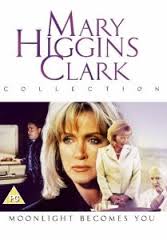
MARY HIGGINS CLARK'S MOONLIGHT BECOMES YOU
US, 1997, 90 minutes, Colour.
Donna Mills, Robert Joy.
Directed by Bill Corcoran
Mary Higgins Clark's Moonlight Becomes You is an entertaining, if slight, murder mystery. It is based on a novel by the prolific American writer, Mary Higgins Clark. It is a star vehicle for Donna Mills who, after many years, still looks very glamorous. However, her leading man is a rather stodgy, unromantic lead, unusual for this kind of film. It is glossy - but entertaining, with some twists.
1.Entertaining murder mystery? Telemovie?
2.Locations, affluent Rhode Island mansions, the town and the roads? The musical score?
3.The title, the use of the song? Significance?
4.The murder mystery, introduction to all the characters, the potential motives, the complications, intrigues, clues, twists?
5.The focus on Maggie: as a fashion photographer, her skills, her friends, the party, relationship to Liam? Meeting Earl? Meeting Nuala and the story of her father, the separation from Nuala, Nuala and the camera and encouraging her as a photographer? The decision to go for the weekend, the car and the breakdown, the encounter with the sheriff? Finding Nuala's body? Her reaction, her vowing to find out the truth? Her encounter with the various suspects, her being terrorised in the home? The suspicions of the sheriff, her attraction towards him, falling in love? The funeral? The discussions with the old ladies from the home? The visit to the nursing home, the doctor and suspicions? The funeral bells and the visit to Earl's business? His refusal to let her see the bells? Suspicions, photographs, her almost being killed in the dark room? The return at midnight, her being attacked, put in the coffin? The rescue and the revelation of the truth? The trapping of the doctor's wife in hospital? The happy ending with the sheriff?
6.The sheriff, the motorbike, giving her a lift, suspicions, investigation, visit to Earl's establishment, the apprehension of Liam? A future? A rather deadpan actor in this role?
7.Liam, romance, relationship to Nuala? His presence, support of Maggie? His unmasking and the motivation of property, wheeler-dealing?
8.Malcolm, the deal with Nuala and buying a house? His discussions with the other ladies? His relationship with Debbie, her getting information about the residents and giving it to him? The clash with Debbie? Suspicions by the sheriff, driving over the cliff?
9.Dr Lane, suspicious behaviour, his reputation, his wife and her friendship, the contrast with the suspicious nurse going round the rooms? The irony of the entrapment? The nurse as vindicated and being suspicious?
10.Nuala, her life, her home, gracious and friendly? Her change of will? Greta and Letitia, the discussions about deaths in the home, Greta's death, Letitia and the funeral? Then being victimised by Liam?
11.The popular ingredients of a murder mystery?
Published in Movie Reviews
Published in
Movie Reviews
Tagged under
Saturday, 18 September 2021 19:33
Monster Squad, The
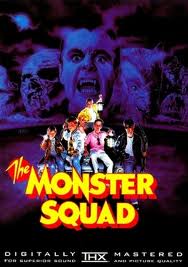
THE MONSTER SQUAD
Canada, 1987, 81 minutes, Colour.
Stephen Macht, Duncan Regehr.
Directed by Fred Dekker.
The Monster Squad is an amusing horror imagination story. A group of American youngsters have a club devoted to horror films and monsters. They certainly know a lot about horror lore. Suddenly out of the sky, Dracula, literally, falls - along with some coffins of vampires, Frankenstein's monster. A mummy escapes from the local museum. A local man is a wolf man. The gill monster emerges from a lake. There is also a book of Professor Van Helsing and the boys use it to rid the world of the monsters - there is also an amulet which creates a hole in the universe through which the monsters, of course, go. (The film has a lot of crass and crude schoolboy humour which rather spoils the overall humorous effect.) Co-writer, Shane Black, went on to write Lethal Weapon and other action thrillers.
1.Exercise in imagination? Reality and fantasy?
2.The town, the way of life, school, homes? The monsters, make-up and special effects? Stunt work? Musical score?
3.Plausibility/implausibility? The boys and their love of horror, its effect on them? Their knowledge, tests and initiations? Nightmares?
4.The boys as ordinary, life in their families, school, together, the club, initiating Rudy, the quiz, their knowledge of details? Meetings, comics, posters? The leadership, decisions? The book and the need for translation? Going to the old German and his befriending them? Seeing the monsters? Looking for the virgin to read the formula?
5.The plane and Dracula, the coffins, falling from the sky? The wolf man and his anguish, ringing the police, transformation? The mummy escaping? The Frankenstein monster and Dracula raising him to life with the lightning?
6.The role of Dracula, van Helping’s diary, his mission? Frankenstein's monster trying to get the book? Re-enacting sequences from the Boris Karloff original - especially his playfulness with the little girl? Making friends? Dracula seeking power, in the house? All the monsters coming together in the house?
7.The old German, reading the book, with the boys, knowing monsters - and his concentration camp number? With the boy's sister, the little girl and reading the formula?
8.Sean's father, the police work, the wolf man and his phone calls, Dracula's car driving through the police car, the fighting with Dracula, the police shooting the vampires? The fight with the explosives?
9.The build up to the climax: the truck, the mummy unwinding, Rudy combating the three vampires, the sister trying to say the formula, Dracula as a bat, the father's struggle with the wolf man and shooting him, the creature and Horace shooting him (and the scoffing boys looking on)? The little girl reading the spell, Dracula's advance, the amulet, the Frankenstein monster saving them? The hole and everybody being dragged through? Van Helping’s reappearance? The pathos of Frankenstein having to leave?
10.The sketch of the boys, their age, experience, relationships with each other, Eugene and his nightmares, Phoebe and her presence? Rudy and his initiation?
11.A tongue-in-cheek horror film?
Published in Movie Reviews
Published in
Movie Reviews
Tagged under
Saturday, 18 September 2021 19:33
Money For Nothing
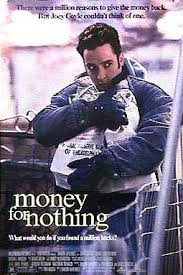
MONEY FOR NOTHING
US, 1993, 100 minutes, Colour.
John Cusack, Debi Mazar, Michael Madsen, Benicio Del Toro, Michael Rapaport, Maury Chaykin, Fionnula Flanagan.
Directed by Ramon Menendez.
Money for Nothing is about an unemployed longshoreman in Philadelphia who finds a million dollars from an armoured car. There is the question whether he gives back the money or not - especially urged by his family. However, he decides to keep it, splash it around, offer some of it to his girlfriend so that they can leave America. Michael Madsen is the detective who investigates the case. John Cusack is the longshoreman. However, circumstances catch up with him. He tries to leave the country with his girlfriend but is arrested at the airport. He is interviewed, being asked whether he would do it again, and he says he would. However, the real-life longshoreman on whom the film is based, committed suicide not long before the film was released.
The film is an angle on the American Dream, faced with the reality of hardship and unemployment.
1.The impact of this drama about the ordinary American? Money for nothing? The shattering of the dream? The title and its irony? Free money? Money which led to nothing?
2.The Philadelphia locations, the wharves, the roads, homes, offices? Authentic atmosphere? The musical score?
3.The moral issue, the finding of the money, the family and its sense of honesty? Joey and his decision to keep the money, splashing it around, trying to get it laundered, giving it to his girlfriend? The possibilities? The reaction of friends, of family? His being informed on to the police? The pursuit by the armoured car owners? The police and justice? The final interview and the moral issues, dilemmas, solutions?
4.John Cusack as Joey Coyle? 26 years of age, unemployed, unable to get a job from his brother, living at home? Memory of his father? Relationship with his mother? The clashes in the family - especially the earlier talks on honesty and the later discovery that he had the money? Finding the money, the decision to keep it? Splashing it around in the hotels? The proposition to Monica? His going to the money launderers? His friends? The dilemmas about the money, the family discover, his reaction? Giving the money to Debi, her decision, changing his hair, personality, passport, the attempt to leave the United States? The money launderers and their giving him coins? The watching of the television, knowing the request to give the money back, his inability to do this? His future, the loss of the money, money for nothing? The irony of Joey Coyle's real-life suicide?
5.The portrait of the family, the brother and his integrity, the mother and her sense of honour? His sister-in-law, the young girl? Money as the fulfilment of their dreams, their option not to take it?
6.Debi, her relationship with Joey, her progress in the bank, not listening about the money? His bringing it to her office, putting it in the drawer, her decision? Swift action, the dangers at the airport, having to hide the money, overweight luggage? The police and her final decision to thrown the money to the people?
7.Joey's friend, his situation, his being beaten, his decision to speak to the police?
8.The money launderers, shady dealings, tricking Joey?
9.The detective, his work, following leads, his method, media information, discussions with the armoured guard driver? The money, final tip-off? The confrontation at the airport?
10.The background of the wharves, the longshoremen, employment and unemployment, opportunities and lack of opportunity? An American slice of life of the '90s?
Published in Movie Reviews
Published in
Movie Reviews
Tagged under